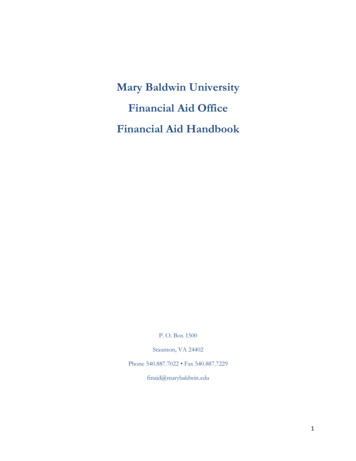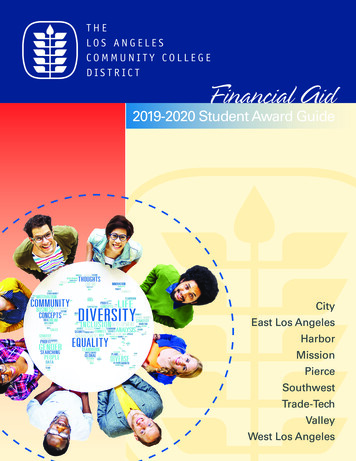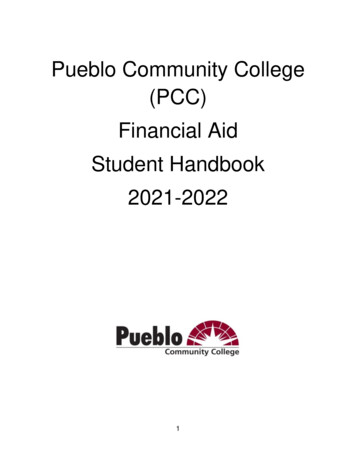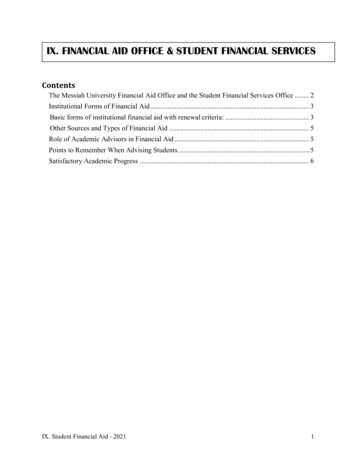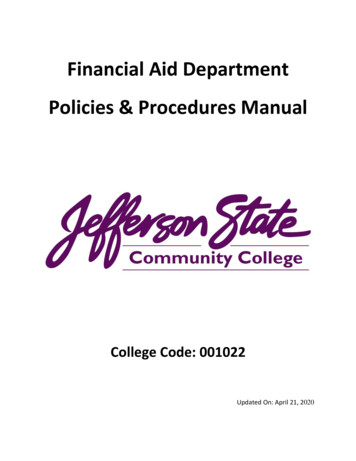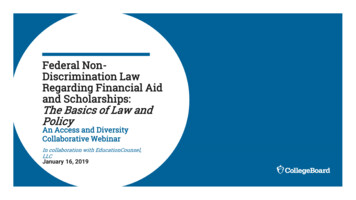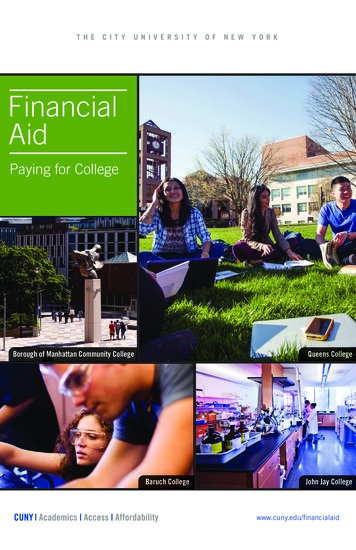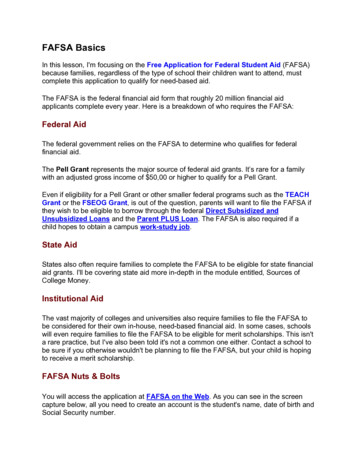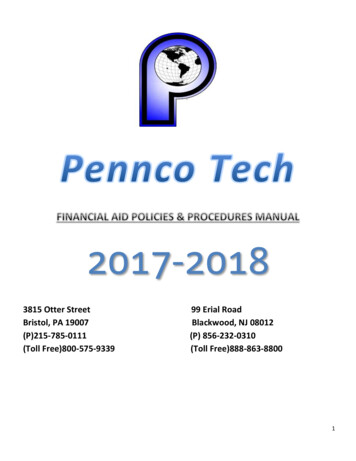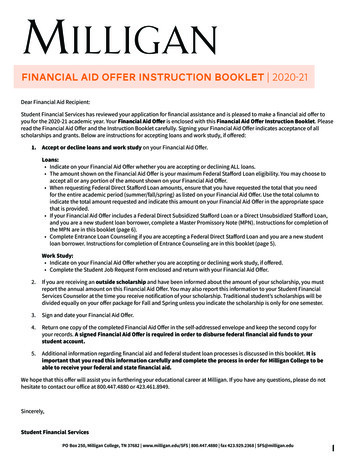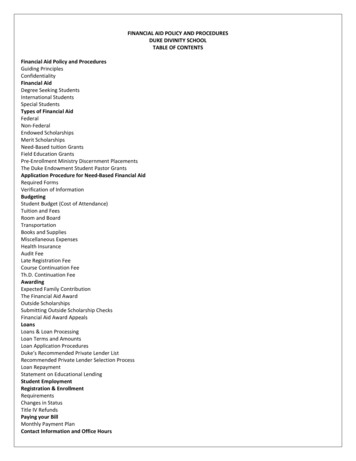
Transcription
FINANCIAL AID POLICY AND PROCEDURESDUKE DIVINITY SCHOOLTABLE OF CONTENTSFinancial Aid Policy and ProceduresGuiding PrinciplesConfidentialityFinancial AidDegree Seeking StudentsInternational StudentsSpecial StudentsTypes of Financial AidFederalNon-FederalEndowed ScholarshipsMerit ScholarshipsNeed-Based tuition GrantsField Education GrantsPre-Enrollment Ministry Discernment PlacementsThe Duke Endowment Student Pastor GrantsApplication Procedure for Need-Based Financial AidRequired FormsVerification of InformationBudgetingStudent Budget (Cost of Attendance)Tuition and FeesRoom and BoardTransportationBooks and SuppliesMiscellaneous ExpensesHealth InsuranceAudit FeeLate Registration FeeCourse Continuation FeeTh.D. Continuation FeeAwardingExpected Family ContributionThe Financial Aid AwardOutside ScholarshipsSubmitting Outside Scholarship ChecksFinancial Aid Award AppealsLoansLoans & Loan ProcessingLoan Terms and AmountsLoan Application ProceduresDuke’s Recommended Private Lender ListRecommended Private Lender Selection ProcessLoan RepaymentStatement on Educational LendingStudent EmploymentRegistration & EnrollmentRequirementsChanges in StatusTitle IV RefundsPaying your BillMonthly Payment PlanContact Information and Office Hours
Duke Divinity School Financial Aid Policies and Procedures ManualIntroduction:Federal regulations mandate that institutions have written policies and procedures. The purpose ofthis document is to record policies and procedures surrounding the delivery of financial aid at DukeDivinity School. If there is not a policy or procedure to addresses a given issue, the Duke DivinitySchool Office of Financial Aid is expected to use professional judgment based upon the intent of allfinancial aid programs and practices.Duke Divinity School awards and distributes its financial resources with a view toward Christian charityand stewardship. Most Divinity School students receive some form of financial assistance. Studentsshould be mindful that institutional aid is a privilege to be enjoyed thanks to many benefactors whohave graciously given funds to the school. Divinity School financial aid may include institutionalscholarships, grants, and field education grants. In addition, federal work study and federal loans maybe available. Students are encouraged to seek financial assistance from his or her local church, civicgroups, and foundations.The Duke Divinity School Office of Financial Aid coordinates all federal, private and institutionalfinancial aid programs within Duke Divinity School. This entails determining student eligibility for thevarious financial aid programs, assisting students with determining their best financing options andstudent loan debt management counseling.Confidentiality:All financial aid documents are retained in the files of the Divinity School Office of Financial Aid. DukeDivinity School financial aid does not share student information with a spouse or parent without thewritten authorization of the student.
Determining Federal Financial Aid Eligibility: A degree seeking student enrolled at least half-time (6 credit hours Fall, 6 credit hours Spring) Be a United States Citizen, United States National, or United States permanent resident in theUnited States for other than a temporary purpose (supportive documentation may be requiredto verify residency or citizenship status). Maintain satisfactory academic progress (3.0 GPA) cumulative. Not be in default of any loan or owe a repayment on a Federal Pell Grant, FSEOG, or StateGrant. Demonstrate financial need based on the FAFSA (Free Application for Federal Student Aid).Federal aid is awarded in accordance with the Department of Education guidelines. Federal loans areawarded after any grants or scholarships (including external scholarships which must be reported tothe Duke Divinity School Office of Financial Aid immediately) and are applied toward any unmet cost ofattendance amount.Degree Seeking Students:A degree seeking student is one who is enrolled in courses for credit and is recognized by the institution asseeking a degree or formal award. These students are normally considered for various forms of financial aid.International Students:All entering international students must submit the full amount of the first year’s tuition to the Divinity Schoolfinancial aid office by no later than June 1 for fall enrollment (See further details in the admissions sectiontitled “Policies and Procedures for International Students”). All returning international students are requiredto make an appointment with the financial aid office prior to June 1 to review funding sources for theupcoming academic year (including field education grants, outside resources, scholarships, and otheremployment). If there are funding concerns, the Duke University International Office will help the studentexplore work authorization and visa options.Special Students:A special student is one who is enrolled for academic credit, but who is not a candidate for a degree at thattime. No financial aid is available.
Tuition and Fees:Tuition rates are approved by the Board of Trustees on an annual basis in late February. Divinity specific fees are also approved inFebruary. All other University fees are approved in June.Budgeting:Cost of Attendance 2015-2016 Estimated Cost of Attendance*TuitionM.Div. tuition rate equal to 21,500 per yearM.T.S. tuition rate equal to 22,210 per yearM.Div. / M.S.W. tuition rate equal to 27,780 per yearTh.M. tuition rate equal to 25,800 per yearTh.D. tuition rate equal to 34,900 per yearM.A.C.S. tuition rate equal to 22,830 per year†M.A.C.P. tuition rate equal to 21,000 per year†D.Min. tuition rate equal to 23,280 per yearStudent Health Fee (required fee) 752Transcript Fee (required fee) 40Student Life Ministry, Graduate 162Activity, and Divinity Government Dues(required fees)Recreational Facilities Fee (required 260fee)TOTAL 22, 714Room and Board:Room and board is based on a survey of average utilities and rent for two bedroom apartments in the Durham area. Thisamount is used for all Duke University graduate and professional student budgets.Transportation:Transportation costs are based on a student living locally and commuting to class five days a week. This amount is usedfor all Duke University graduate and professional student budgets.Books and Supplies:A survey of required books lists and average costs at Cokesbury bookstore are used to collect costs for books andsupplies.Miscellaneous Expenses :Miscellaneous expenses include costs for clothing, toiletries, recreational, and other personal expenses. This amount isused for all Duke University graduate and professional student budgets.Health Insurance Fee:The University requires all registered students have health insurance. To help students meet this requirement, theUniversity offers a comprehensive health insurance plan covering a wide range of services. Duke automatically enrollsstudents in this program at the start of the fall semester, unless students waive coverage by the deadline and provideproof of other health insurance coverage. The Divinity School’s Financial Aid Office includes the lowest cost of healthinsurance for students in the cost of attendance.Audit Fee:Anyone seeking to audit a course in the Divinity School must, with the consent of the instructor concerned, securepermission from the Office of Academic Affairs. A fee of 600 per course will be charged to all auditors who are notenrolled as full-time students.Late Registration Fee:Continuing students who fail to register during the registration period must pay a fee of 50 to the bursar.Course Continuation Fee:In instances where a student has registered for but not completed all the courses or requirements for his or herprogram, a 600 per semester fee is required. The student must also register for the continuation course (CONTDIV1).ThD Continuation Fee:ThD students who have completed coursework will need to register for the continuation course (CONTDIV, section 2) forthe fall and spring semester. For the 2012-2013 academic year, the Th.D. continuation fee is 2,700 per semester. Thestudents must register for the continuation course (CONTDIV1).
AwardingThe principles regarding the disbursement of institutional sscholarships are as follows:1. DDS tuition scholarships, Ministerial Promise Awards, MTS Scholarships, MACS Scholarship, Emerging Leaders Scholarship andChristian Tradition Scholarship are recommended on the basis of availability of funds. In order to receive a tuition scholarship fromthe Divinity School, a student must be enrolled full time and maintain an overall academic average of 2.0 or higher.2. Tuition Scholarships will be made within the limits of the conditions set forth governing each source.3. The conditions at the beginning of the academic year determining financial needs shall be the governing criteria for the year.Financial aid programs are set up on a yearly basis.4. DDS financial aid awards are made on an academic-year basis. The assistance may consist of tuition scholarships, field educationgrants, employment, and loans. A new application must be filed each year.5. Tuition scholarship awards are higher for the first year of study, 33%, to assist students in the M.Div. degree programs (excludingdual and joint degree programs) as much as possible through their transitional first year at Duke. Consequently, grants for thesecond and third years of study for those students will be less, 22%, than those awarded for the critical first year.6. The priority FAFSA application deadline is May 1 for all students. Financial aid applications for students anticipating fallmatriculation are reviewed beginning the prior March.7. Student pastors serving United Methodist churches can be notified after the pastoral charge and annual conference determinesalary schedules.8. Ordinarily, tuition scholarships are not available beyond six semesters.9. Financial aid resources for MTS, MACP, D.Min., and Th.D. students are limited. Candidates are encouraged to apply early.10. Special students and Th.M. students (with the exception of one international scholar annually) are not eligible for any form offinancial assistance from the Divinity School.11. Th.M. and Th.D. students are eligible to apply for denominational assistance, federal loans, and federal work study.Expected Family Contribution:The Expected Family Contribution (EFC) is calculated by the Department of Education and used to determine eligibility for institutiongrants and federal aid programs such as the Federal Stafford Loan program and Federal Work Study.Financial Aid Award:Duke Divinity School’s financial aid award will include a combination of scholarships, grants, work study, outside scholarships/grants,and federal loans up to the cost of education.Student's Cost of Attendance Budget - Family Contribution Demonstrated NeedOnce need has been determined, an aid package is created for the student to meet that financial need.Aid packages generally include either merit scholarships or need based grants, federal work study and federal loans.Outside Scholarships:Many local churches, conferences, or other governing bodies provide gifts and grants for theological education, such as ministerialeducation funds that provide grants and/or service loans to theological students. The student makes application to the home church,annual conference, presbytery, or other governing body. The financial aid office cooperates with these church agencies in makingrecommendations and in handling the funds. United Methodist students and others must be under the care of the appropriatechurch body to be eligible for church support. The school cannot compensate for a student’s indisposition to receive church fundswhen such are available on application through the Annual Conference Ministerial Education Fund or other agencies.Outside scholarships provide an important benefit to students who are receiving need-based financial aid from Duke Divinity School.Students are required to report all outside scholarships received to the Financial Aid Office.Submitting Outside Scholarship Checks:Outside scholarship checks should be sent directly to the Divinity School’s Financial Aid Office at P.O. Box 90969, Durham, NC 277080969. Outside scholarships will count towards the cost of education and if presented after the original award has been determined,will reduce the amount of work study or loans a student has previously received.Financial Aid Award Appeals:Over 97% of Divinity students qualify for institutional grants or scholarships. Students who do not receive a need based grant maymake a written appeal to the Divinity School’s Financial Aid Office. Appeals should be sent to the Divinity School’s Financial AidOffice at P.O. Box 90969, Durham, NC 27708-0969.
Loans and Loan Processing:LoansAfter eligibility to borrow is determined by the DDS Office of Financial Aid, students will be required to complete an online entranceinterview and sign an electronic promissory note with the lender. Once all the required steps are completed, Duke University’sStudent Loan Office will certify the loan and the proceeds will be credited directly to the student’s account at the Bursar’s Office.The average loan debt for Divinity students who graduated in the 2014 aid year was 44,000. While we encourage students andtheir families to borrow with care, we do understand that borrowing for one's education is an important investment in the future.We encourage students to borrow wisely, taking on no more debt than is necessary and manageable.Loan Terms and AmountsPlease see loan types and maximum amounts in “Types of Financial Aid”.Loan Application Procedures:Federal Direct Unsubsidized Stafford Loans:First Time Borrowers1. Complete Federal Application for Student Aid (FAFSA) at http://www.fafsa.ed.gov/2. Accept the loan on ACES3. Complete Stafford/Perkins Entrance Counseling at http://www.studentloans.gov4. Complete the Federal Stafford Loan Master Promissory Note at http://www.studentloans.gov5. Once Entrance Loan Counseling has been completed and the Master Promissory Note has been submitted, the loan will becertified by the Loan OfficeContinuing Students1. Complete the Federal Application for Student Aid (FAFSA) at www.fafsa.ed.gov (web link)2. Accept the loan on ACESFederal Perkins Loans:First time borrowers1. Complete Federal Application for Student Aid (FAFSA) at http://www.fafsa.ed.gov2. Accept the loan on ACES3. Complete Stafford/Perkins Entrance Counseling at www.studentloans.gov4. Within two days of accepting the Perkins loan, borrowers will receive an email from Duke’s servicer, ECSI. This email will provideinstruction to complete the promissory note on lineContinuing Students1. Complete Federal Application for Student Aid (FAFSA) at http://www.fafsa.ed.gov2. Accept the loan on ACESFederal Direct Grad PLUS:During the application process a credit check will be conducted, but there are no income or collateral requirements1. Complete Federal Application for Student Aid (FAFSA) at http://www.fafsa.ed.gov2. Complete your Grad PLUS Loan Master Promissory Note online at http://www.studentloans.gov3. Confirm acceptance of the loan after receipt of email from Student Loan OfficeDuke’s Recommended Private Lender ListStudents have the right to use the lender of their choice for any private loans. The Duke University Financial Aid Office is committedto providing our students and their families with accurate information about the best available rates, benefits and service. As aresult of this commitment, the Aid Office has created a Recommended Lender List to help with the selection process. Our researchindicates the lenders listed below offer excellent customer service, competitive interest rates and numerous borrower benefits. If astudent chooses to borrow with a lender from outside the Recommended Lender List, the Aid Office will be happy to process it foryou. Duke University will not discourage, refuse or delay certification of a borrower’s loan eligibility, regardless of the lender. Theapplication procedures and steps to follow remain exactly the same.Our Recommended Private Lenders for 2015-2016 are:Citizens OneU-fiDiscoverWells FargoPNCSunTrust
Recommended Private Lender Selection Process:Duke’s recommended lenders are chosen annually by a committee of financial aid professionals. Each year, DukeUniversity sends a Request for Information (RFI) to a number of lenders. The responses from the lenders are thenanalyzed based on the following criteria:Promotes responsible borrowingDemonstrates a default rate that is comparative to the national levelHas a responsive customer service centerProvides the same competitive benefits to all borrowersFinancially stableDuke University does not receive, and will not accept, inducements from lenders in exchange for inclusion in ourrecommended lender list.Statement on Educational LendingDuke University is committed to creating and sustaining innovative, effective educational programs of the highestquality. We see our mission as investing in the personal, academic and professional growth of our students so they willmake a positive difference in the wider world after graduation. Our investment in the talent of our students requires afinancial partnership between the university and students themselves and, at least at the undergraduate level, theirparents. The university invests in programs of exceptional quality and provides approximately 150 million annually invarious forms of scholarships and fellowships, outright grants with no expectations of repayment. Students and parentscontribute to the costs of a Duke education through tuition and fees and by covering necessary living expenses duringthe period of study.Educational loans are an essential component of this partnership, enabling students at all levels and parents ofundergraduates to borrow funds to help support the costs of a Duke education. While Duke University funds a smallpercentage of the loans our students request to further their education, most loans are provided through federallyregulated programs. These programs are authorized by the Higher Education Act and regulated by the Department ofEducation. In addition, private lenders offer a variety of educational loans outside the federal programs. Duke Universityapprises students of their right to choose any authorized private lender and will work cooperatively with any lenderstudents choose. The principal types of loans offered to Duke students and/or their parents include: Federal Perkins Loans – for undergraduate, graduate and professional schools students. Loans from thisprogram, funded by a combination of federal and institutional funds, are collected by the university with theproceeds being used to fund additional loans. Federal Direct Stafford Loans – for undergraduate, graduate and professional school students. SubsidizedDirect Stafford loans are offered to students with federally defined demonstrated need. Those students withoutneed may borrow from the unsubsidized Stafford funds. Federal Direct PLUS Loans – for parents of undergraduate students and for graduate and professionalstudents. Originally created to provide parents with reasonable credit records access to federal educationalfunds, this program was made available to graduate and professional students in 2006. Federal Department of Health and Human Services Loans -- available to students in designated medicaleducational programs. Duke Institutional Loans – funded largely from endowments created by university donors, these loans areavailable to undergraduate, graduate or professional students in accordance with donor stipulations. Thesefunds complement resources available under federal programs. Private Loans – supplement federal programs for students at all levels. These programs are offered nationallyby banks, state agencies and other non-profit organizations.
Duke University adheres to the following principles in counseling students and in working with lenders: Duke University acts always with the best interests of our students in mind. Duke University conforms to all federal regulations and other legal requirements in serving the needsof our students. Neither Duke University nor members of its staff receive financial benefits from lenders. Allemployees involved in financial aid and student lending at Duke are subject to a rigorous conflict ofinterest policy that requires annual disclosures and management review of any business relationship ofemployees or their immediate families. All financial aid and student lending functions at Duke University are staffed or managed entirely byDuke employees. Neither Duke nor its employees accepts unpaid goods or services of material valuefrom lenders. Duke administrators may serve as unpaid members on lender advisory boards, with thepurpose of improving terms and service for student borrowers. In such cases, the university pays allexpenses for travel, lodging and food and prohibits employees from participating in unpaid excursions,golf outings, sports events, performances or similar forms of entertainment. Duke University protects the confidentiality of lending information and does not cooperate with anylenders in marketing financial products to students or parents. Duke University may provide listings of recommended private lenders to their students to facilitatetheir search for an appropriate lender. When such lists are provided, they will meet the followingcriteria:They will be publicly available via the Duke website.They will include at least five lenders with comparative information on terms, service, etc.They will include a statement of the student’s right to choose any approved lender.They will include a statement that neither the university, the school, nor its staff has any financialinterest in the students’ choice of lenders.The list of recommended private lenders is reviewed annually by a rotating University committee andsubmitted to the Executive Vice President for final approval. The goal of the Aid Office is torecommend lenders who offer the highest value to students in terms of both cost and service.Recommendations are based on an annual analysis of lender performance in several categories:customer service to the borrower and university, processing efficiency, borrower benefits, andfinancial stability in the marketplace. We also consider supplementary materials such as debtmanagement literature, website content and ease of use, and other information available to benefitthe student borrower.FINANCIAL AID PROGRAMS*Federal financial aid programs are listed below (except of VA GI Bill/Yellow Ribbon)Perkins LoanFederal Direct UnsubsidizedLoanFederal Direct Graduate PlusLoanFederal Work Study
Based onfederal needand availabilityof fundsLimits/YearYESNO 8,000 20,500(Depending on financialneed, the amount of otheraid received, andavailability of funds atDuke Divinity School.)NOAverage award is 3,000After the maximum amountper year of the unsubsidizedloan is deducted from the costof attendance budget.NOTE: Wages paid partiallyfrom federal funds, matchedwith university funds;targeted toward studentswith the greatest need; anEFC of 4,000 or less.N/AAverage awards are 4,000/yearInterestOrigination Fee5%5.84%6.84%Interest does NOT accruewill student is enrolled atleast half-time in a degreeseeking program.Interest will accrue(accumulate) and becapitalized (that is, yourinterest will be added to theprincipal amount of yourloan)Interest will accrue(accumulate) and becapitalized (that is, yourinterest will be added to theprincipal amount of your loan)0%3.6%4.6% 57,500- (of which no morethan 23,000 can beSubsidized Loans) 138,500 * IncludingUndergraduate Loans6 months after graduation orif enrollment is less than halftime6 months after graduation or ifenrollment is less than halftimeAggregate LoanLimitGrace Period9 months after graduationor if enrollment is less thanhalf-time.YESN/AN/A
Federal Work Study:The Federal Work-Study Program is an employment program for U.S. citizens and permanent residents funded through acombination of federal and institutional aid. FWS is a need-based award and is not available to all students. Since FWS jobs are ingreat demand, interested students should complete the FAFSA application by the May 1st deadline to be considered for FederalWork Study.Some financial aid recipients will have an academic-year work study offer in their aid package. If a student chooses to work, he/sheis responsible for securing a job and earning the funds, which are paid bi-weekly. The Aid Office can assist by providing job listingsfor on campus employment opportunities through DukeList. Work study recipients are able to work up to 19.9 hours per week orless. Most students work in university departments or offices on campus, although students can also choose to seek off-campus ornon-university jobs.Student employees are paid through the Federal Work Study (FWS) Program. There are a number of FWS community-service jobswith non-profit agencies. These opportunities include America Reads, America Counts, and other public-service jobs. The widestselection of job listings is available at the beginning of each semester online through DukeList at http://dukelist.duke.edu/, althoughopenings occur and are listed throughout the year.Veterans BenefitsWe are excited that you have chosen Duke Divinity School to pursue your academic endeavors. The Duke Divinity School offers 8spaces to veterans who qualify for the VA’s Yellow Ribbon Program for Master’s degree seeking students. Please refer to the DukeUniversity Registrar website to review the necessary information to apply for, and continue to receive, veteran’s educationalbenefits while enrolled at Duke Divinity School: Duke University Registrar.Non Federal Financial Aid Programs:External ScholarshipsThe Duke Divinity School maintains an External Scholarship website which lists scholarship opportunities from a variety of externalorganizations: external-scholarships. External awards, which are prestigious and avaluable acknowledgement of a student's intellectual project and promise, typically replace student loans.Endowed ScholarshipsCertain special funds have been established as endowments, the income from which is used to provide financial aid through meritscholarships, need based grants and field education grants for students, support for professorships, library resources, andenhancement of the Divinity School program. Individuals do not apply for any of these funds. All awards are made throughappropriate committee action according to university guidelines. Students are asked to write a thank you note to the person whomade the scholarship possible.Merit ScholarshipsStudents applying for admission to the M.DIV., M.T.S., and Th.D. degree programs are automatically considered for scholarships.Students accepted into the M.A.C.P. and D.MIN. degree programs receive an automatic 25% scholarshipField Education GrantsAmounts ranging from 7,600 to a maximum of 9,000 are made available through the Divinity School and The Duke Endowment tostudents who are approved to participate in the field education program. Persons participating in the field education program,either summer or winter, may not engage in other forms of employment.Pre-Enrollment Ministry Discernment PlacementsA 10-week rural church placement in North Carolina is available to entering United Methodist Master of Divinity students during thesummer prior to their enrollment in the fall semester. The Duke Endowment provides up to 9,000. The church will provide room,board, and travel expenses.The Duke Endowment Student Pastor GrantsUnited Methodist students serving under appointment as student pastors in the state of North Carolina may qualify for tuitionassistance up to 6,500 through The Duke Endowment Student Pastor Grant.
Pre-Enrollment Ministry Discernment PlacementsA 10-week rural church placement in North Carolina is available to entering United Methodist Master of Divinity students during thesummer prior to their enrollment in the fall semester. The Duke Endowment provides up to 9,000. The church will provide room,board, and travel expenses.The Duke Endowment Student Pastor GrantsUnited Methodist students serving under appointment as student pastors in the state of North Carolina may qualify for tuitionassistance up to 6,500 through The Duke Endowment Student Pastor Grant.Students in eligible degree seeking programs who submit a completed FAFSA application by the May 1st deadline will beconsidered for institutional grants, loans, and Federal Work Study programs.Required FormsFree Application for FederalStudent Aid (FAFSA)Additional InformationHow to Apply/Where to SendApply online after January 1at www.fafsa.ed.gov.Duke Divinity School’s federalcode number is 0002920.Be sure to sign the FAFSAeither electronically with aPIN number provided by theDepartment of Education orby printing out and mailing aFAFSA signature sheet to theprocessor. More informationon PIN numbers can be foundat www.pin.ed.gov.Letters explaining any specialcircumstances, unusualexpenses or other detailswhich will present a clearerpicture of a family’s financialsituation may be mailed tothe Office of Financial Aid.Submit letters of explanationto the Duke Divinity SchoolOffice of FinancialDue DatesMay 1May 1
Registration & EnrollmentRequirementsAs a recipient of financial aid at Duke, students are required to enroll in classes each semester, meeting the deadlines andprocedures established by the Divinity School’s Registrar’s Office. Duke expects students to enroll for and complete a minimum ofthree courses per term to maintain financial aid eligibility for Divinity grant funds and a minimum of four courses per term for meritscholarship funds. Eligibility for some types of federal aid, in
The Duke Divinity School Office of Financial Aid coordinates all federal, private and institutional financial aid programs within Duke Divinity School. This entails determining student eligibility for the various financial aid programs, assisting students with determining their best financing options and student loan debt management counseling.
